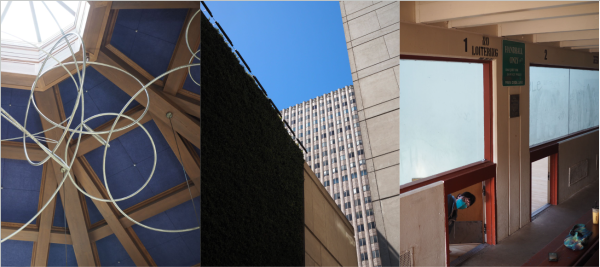The perfect compromise: Maria White Lowell
If it comes to Lowell having to change its name, it should be renamed after the poet Maria White Lowell (1821-1853), James Russell Lowell’s first wife. On top of the fact that renaming after her would avoid the significant costs involved in completely rebranding the school, Maria is the perfect candidate for Lowell’s new namesake, as she was a woman, social activist, and, most importantly, credited with turning James Russell Lowell into an abolitionist.
James Russell Lowell, Lowell’s current namesake, was put into the spotlight recently after the SFUSD School Names Advisory committee identified Lowell as one of 44 schools with a problematic namesake. According to committee member Jeremiah Jeffries, Lowell was included on the list because the committee found evidence that he had expressed racist beliefs before he turned to abolitionism. Now, Principal Dacotah Swett must put forward a new name or namesake for Lowell by Dec. 18, and Maria is the best option.
Renaming after her will save an estimated $150,000 to $200,000 and countless hours of work. The money would be spent buying new school gear, buying new uniforms for more than 30 Lowell sports teams, and replacing signs around campus. Additionally, people would have to spend time redesigning the school’s logo and communicating the name change to all of the third parties, like colleges, that would need to know.
This is not, however, a desperate jump at anyone who shared the last name in an attempt to save money: Maria has various other qualities that make her worthy of being the school’s namesake. For one, she would increase female representation. Currently only 3 of SFUSD’s 12 high schools named after historical figures are named after women, so naming Lowell after Maria would increase the visibility of women who have made an impact on history. Recognizing Maria publicly has the potential to positively influence and encourage the thousands of female students who will pass through the school. Now, Principal Dacotah Swett must put forward a new name or namesake for Lowell by Dec. 18, and Maria is the best option.
Maria is also an inspiration for her political actions. As part of her work for women’s rights, Maria participated in Margaret Fuller’s “Conversations,” seminars where women had space to discuss intellectual subjects, and from which several prominent feminists emerged. Her abolitionist work included membership in the Boston Female Anti-Slavery Society, as well as writing several poems to promote the abolition movement. Considering that during that time abolition and women’s rights were not widely supported like they are now, this is notable and deserves to be honored with a namesake school.
Most notably, Maria is credited with turning her husband into an abolitionist. Though he was racist, writing things like “We believe the white race, by their intellectual and traditional superiority, will retain sufficient ascendancy to prevent any serious mischief from the new order of things” about African-Americans being allowed to vote, Maria eventually convinced him to become an abolitionist. Without her, none of James Russell Lowell’s positive abolitionist influence would have come about, including Martin Luther King Jr.’s I Have a Dream speech, which quoted from James Russell Lowell’s abolitionist poem “The Present Crisis,” the same poem from which the NAACP’s The Crisis magazine derived its name. Renaming after Maria is a compromise between the people who find James Russell Lowell’s racist past unacceptable and those who argue that James Russell Lowell’s extensive abolitionist work should be honored, since the change would credit the woman who sparked that work.
In all, the decision to make Maria our school’s new namesake could neatly solve an issue that many feel rightly passionate about and acknowledge the full range of perspectives on the renaming, making sure that everyone is heard and that the community’s best interests are represented.










Veronica Souza • Feb 18, 2022 at 4:16 pm
I think that renaming Lowell H.S. in honor of Maria Lowell is an excellent idea. I didn’t know this background information and appreciate that you shared it. I like the idea so much that I think it should be done whether or not the Board of Education follows through with their plan to rename schools.
Veronica (Adrian) Souza
Class of 1987
Barbara Lewis • Feb 1, 2021 at 2:46 pm
I *LOVE* this practical, well researched and thoughtful solution. BRAVO.
-A Lowell parent to a sophomore
Jake • Jan 28, 2021 at 9:42 am
This is a terrific idea, and very well argued by the author. I’m all for re-examining the names of our institutions, but spending hundreds of thousands of dollars doing so while teachers remain underpaid and some students face homelessness feels like a mistake – a prioritization of symbolism over real action. Re-naming Lowell High School after Maria White Lowell achieves an important symbolic gesture while preserving precious funds to support the students and teachers of LHS. Someday may we fully find our public schools, so we don’t have to make such highly-charged decisions.
Jake Hanft
Class of 2007
Alan Buchwald • Jan 27, 2021 at 9:29 pm
I think this is an excellent compromise and I would be in favor of it. Former Class President, Spring 1968. Now living in Big Sur, CA.
Trynne Miller • Jan 19, 2021 at 9:05 pm
Sounds like a win-win.
Cecilia Wong • Jan 13, 2021 at 1:19 pm
I don’t support the renaming of the school in general because it costs money and doesn’t deal with the core issue. The money could be well spent to improve the quality of education and benefit the students directly. However, I found the idea of renaming Lowell to Maria White Lowell very thoughtful and insightful and support it. Thanks for all the excellent work and effort!
Great Idea • Jan 4, 2021 at 5:29 pm
Thanks.
Jennifer Thornton • Dec 30, 2020 at 12:52 pm
Thank you for this interesting idea. It sounds like it could be a win for many. I hope Principal Swett will consider it.
Jennifer Thornton
Parent of class of 2023
Jenny Stanley • Dec 18, 2020 at 12:12 pm
Great idea! Has this idea been passed along to the Board of Education?
Hanne OGrady • Dec 17, 2020 at 10:11 am
Excellent and insightful article. I did not know about the important role Maria Lowell played in history, and it is a wonderful idea to name our school in honor of Maria White Lowell.
Thank you,
Hanne O’Grady
( parent of 2018 and 2020 graduates)
Patricia Reyes • Dec 10, 2020 at 11:05 am
I graduated in 1974 and have always been proud to say the name of my high school. I would hate to see the name disappear from sight. I like the idea to change it in honor of Maria Lowell. She played an important role in history and it would be an honor to recognize her for changes she accomplished.
The cost factor is something to consider if the name of the school changes to something else. Naming the school for Maria Lowell is a win win for everyone! Thank for this option.